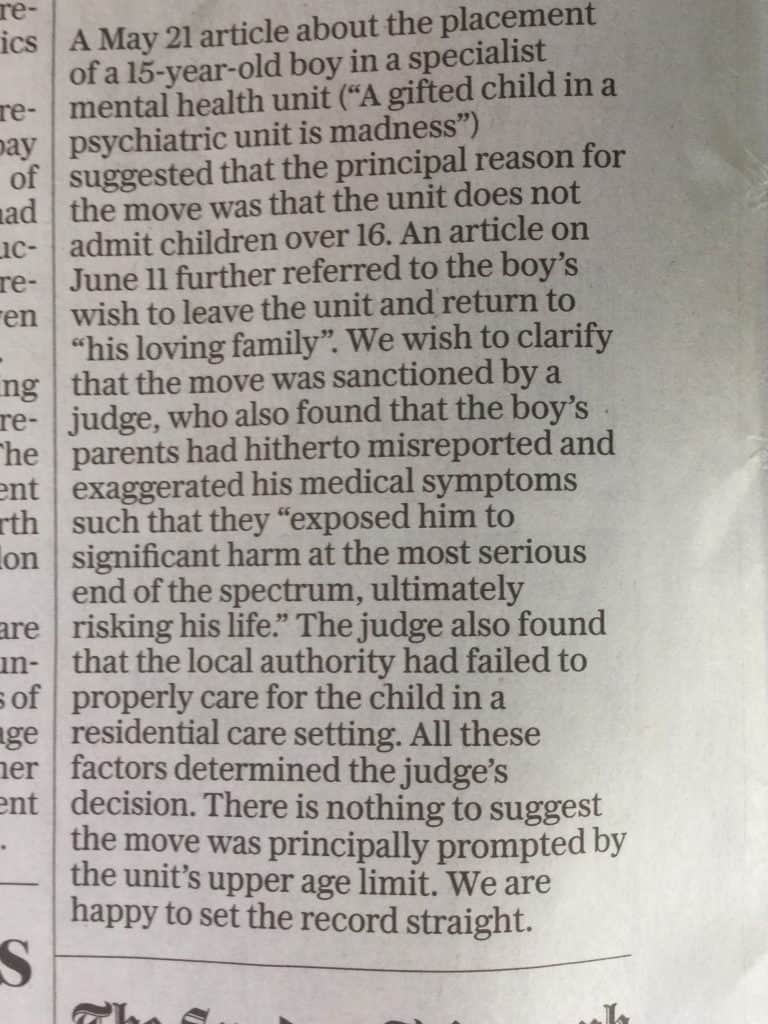We recently made a further complaint to The Telegraph about Christopher Booker’s coverage of the case of Re H (A Child) (Interim Care Order : fact finding) [2017] EWHC 518 (Fam) on 21 May (you can read the post about that complaint here).
We have now heard back from The Telegraph who have agreed to make some corrections. This is good news. However we’ve asked them to go back and look again at some of the points they didn’t accept, and to also consider further similar correction requests we have made in respect of a subsequent column on the same case, published on 11 June (in print only, for some reason – we can’t reproduce the whole thing here for reasons of copyright, but you’ll get the gist from the corrections we’ve requested – it’s in a similar vein to the first piece although focussed in some respects on different specifics).
The correction they have made is showing at the foot of the post from 21 May and reads as follows :
CLARIFICATION: “A gifted child in a psychiatric unit is madness”, above, originally suggested that the principal reason for the placement of the boy in a specialist mental health unit was that the unit does not admit children over 16. We wish to clarify that the move was sanctioned by a judge, who also found that the boy’s parents had hitherto misreported and exaggerated his medical symptoms such that they “exposed him to significant harm at the most serious end of the spectrum, ultimately risking his life.” The judge also found that the Local Authority had failed to properly care for the child in a residential care setting. All these factors determined the judge’s decision and there is nothing to suggest that the move was principally prompted by the unit’s upper age limit. We are happy to set the record straight, and have amended the article.
The Telegraph has also removed the inaccurate line that featured originally :
The need to move him to this place so urgently, when his only wish was to return home, was that the unit’s rules don’t allow it to admit any children after their 16th birthday, which in his case is next month.
We have asked them to look again at the assertions made about the suitability of the unit bearing in mind the child’s needs for assessment as found.
Here is our request for corrections to the subsequent column (we’ve edited for brevity where indicated as some of our email deals with the previous complaint).
…Since making our complaint, we have seen a subsequent column on the same case which appeared in print but does not appear to be online (Attached). It appears to make similar errors. We would be grateful to have your position on that column too please. We set out below the inaccuracies of which we complain in respect of the newer column…
With regard to the 11 June column:
Again this includes a number of material factual inaccuracies.
1. Access to own lawyer
The headline says ‘Boy denied all rights – even to contact a lawyer’. This, along with the sentence “Under an Appeal Court ruling in another case last November, he has a legal right now he is 16 to appoint his own lawyers to represent him” is misleading because it suggests that this child does not have a lawyer.The child is marked clearly in the judgments as being separately represented by his own lawyer in the proceedings. There is nothing we have seen that suggests that he has been unable to contact his lawyer.
When he talks of an “Appeal Court ruling…last November”, we think that Mr Booker is probably referring to the case of Re W (A Child) [2016] EWCA Civ 1051, but if he is he is misinterpreting it and misapplying it to quite different facts here, since this child has not been denied separate representation.
2. Solitary confinement
Mr Booker says the child is “locked away in what amounts to solitary confinement in a secure “psychiatric unit” along with a few much younger, mentally troubled girls.”
This repeats the previous errors. The assertion is internally contradictory; he cannot be in solitary confinement if he is with other children. It is inaccurate to say he is “locked away” or that he is in “solitary confinement”.3. Loving family – distorted
Again, the article refers to the “loving family” without any reference to the adverse findings against them, both of past harm and future risk. We presume you will issue a similar amendment in respect of this piece to that in respect of that published on 21 May.4. Completely cut off from the world
Mr Booker asserts that H “has been completely cut off from the world”. We are concerned about Mr Booker’s sources of information. If the source is the child himself, we are sure you will be aware of the provisions of clauses 6 and 8 of the Code. If the source is the child’s parents, they appear to be at least potentially in breach of the standard reporting restrictions in a family court case. The court has already had to hold a hearing to deal specifically with breaches of ethics by a journalist and questions about collusion by the family. We would be grateful for confirmation that Mr Booker’s columns on this case are based solely on his interpretation of the judgments or interpretation of the unit’s website.It would be of great assistance to your readers if links to the various judgments Mr Booker is relying upon / referring to / disagreeing with could be included in his articles.
As ever, we will update the blog when we hear back from The Telegraph on both the outstanding bits of the complaint regarding the 21 May article and the fresh one.
Update 9 July : On 2 July The Telegraph published the following correction :

The Telegraph did not accept our complaints on other issues, but did agree to add a link to the judgments to the relevant columns, which they have now done here. Good news.
Feature pic : Ink Stained Wretches by Jeff Eaton on Flickr (creative commons – thanks!)

I feel both are missing the point of this case.
If you are going to be transparent about the case, you have to include that vascular EDS ( mutation ) in the COL3A1 gene) this can be life threatening. and should be tested, we do not know if it was or not. Hypermobile joints can hamper a normal life on its own.
POTS is the autonomic nervous system condition, again put together with EDS or Hypermobile joints can limit your life and would need a wheelchair. It is a bit like trying to walk with stretched rubber bands instead of tight ones connecting your joints. It also can have implications with internal organs.
Chronic fatigue, now is this just fatigue or Ramsay defined ME? ME which has a whole many of other complexities such as iron channels, mitochondria, and many other dysregulations.
Cardinal symptom of ME/CFS is the inability to sustain activity of any kind – laughing, jumping, doing a dot-to-dot, just getting dressed is equivalent to climbing mount Everest. A two-day CEPT test proves this. Yet GOSH and against the WHO classification of a neurological condition, treat it as a mental illness? They rehabilitate with a condition that activity is like giving sugar to a diabetic. They have called this condition Chronic Fatigue Syndrome, which is like calling Alzheimer’s the slightly forgetful disease.
It is true there are not many paediatrics that can look after children with these conditions. Because of the complexity you do have to have many tests. The fact this is not mentioned surprises me, as the judge alluded to the problem. If the doctors find this a very difficult illness then the parents would find it very frustrating with conflicting advice and no one listening. Is this what we were hearing here? Were the parents ever given support or did they have to fight for help?
The LA had to amend two finding that there was no danger over the hickman line, which caused [H] anxiety.
I thought hickman lines were removed? It is the responsibility of doctors to put a hickman line in, and procedures should have been followed to administer them? They are not put in just because a mother orders one?
It would also seem that a teenage boy would be able to say if he was in pain?
LA evidence that the parents overused medication by administering more than was prescribed. Now we have the LA fabricating ? Balance is just that balance.
The inadequate care given to [H] when he was taken is of concern?
I guess we will never know how [H] responded to treatment. I would like to point out the case of Merryn Croft. There are 25,000 children with ME in the UK and most, if not all are wrongly diagnosed and treated.
I firmly believe with these rulings that try and protect the children there should always be a follow up to the child’s care and this should be made as public as the rulings, so that transparency makes a difference to our understanding by following the outcome.
My thoughts are with [H]
Merryn’s story
https://www.meassociation.org.uk/2018/05/inquest-ruling-young-drama-student-merryn-crofts-killed-by-m-e-18-may-2018/